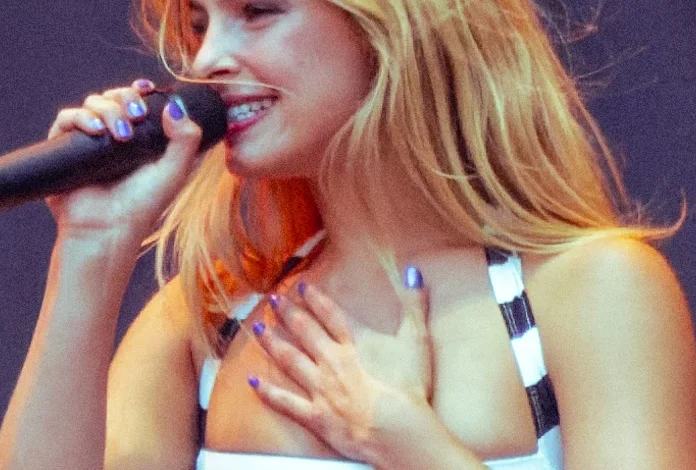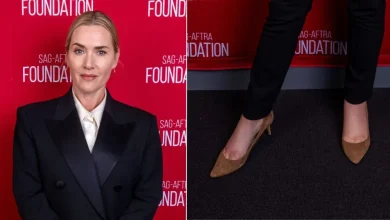Addison Rae brings back lush, moody, authentic Y2K sincerity on debut ‘Addison’

Image from Wikimedia Commons
If you had told me three years ago that Addison Rae would put out one of my favorite albums of the year, I would have laughed in your face. If you had told me two years ago that she would someday be nominated for Best New Artist at the Grammys, or that she’d have one of the most endearing, earnest presences of artists of her generation, I would have called you a liar.
But now, I can’t help but agree and root for her (just a little bit).
“Addison,” released on June 6 after a run of successful singles, is a fresh, exciting debut for one of pop’s most interesting new sounds. It’s not the best album I’ve heard this year by any means, but it’s got sticking power and builds her character as an artist with surprising success. While it might not be great, truthfully, it’s pretty good.
The record gains most of its strength through its cohesion, thanks to the tag-team duo of Elvira Anderfjärd and Luka Kloser acting as the sole producers (shoutout to Max Martin). Each track flows seamlessly into the next. I can’t name a single musical influence that dominates over others in this 2000s-evoking, nostalgia-filled take on what pop should be. As a result, I’m excited to see where she goes next.
“New York”
The production is excellent — there’s no other way to put it, especially in the third chorus when it drops out and floods back in to remind you of its compelling sound. The way the electronic drums and synths build underneath the rapid-fire layered vocals in the chorus is addictive, and the outro? Good old-fashioned-Jersey-club-adjacent fun in a way some of her singles haven’t fully embraced yet.
It’s a better song musically than lyrically, by a long shot. Most lines feel derivative, toeing the line of camp and almost tripping over it. One thing I do appreciate (throughout the entire album) is the consistent voice. Rae and her producers are credited as writers on every track; even if it’s clumsy at times, the style feels authentic to what we know of her by now, like a wink at the audience over the perception of fame she conjures in her lyrics.
With this opening, “Addison” already feels so different from her other fare, yet very consistent. I can tell she’s crafting her trademark sound as we speak.
“Diet Pepsi”
Despite being ridiculously overplayed, making me anything but an objective listener, this song turned everyone’s heads toward Rae’s reappearance last August. The popular TikToker of COVID-19 fame? “2 die 4” and “Obsessed” pop non-event Addison Rae? We paid attention again for good reason. “Diet Pepsi” is a callback to multiple eras of Lana del Rey, a somewhat homage to Madonna, and a cheeky nod at virginity and female sexuality. It’s an impressive cosplay at first glance, yet a strong debut once interspersed with the rest of her discography.
Thematically, it doesn’t resonate with me, but the production is, as always, lush and engaging. The breathy, airy vocals also get stale fast when used as a one-trick pony (like she’s wont to do). I enjoy her live renditions far more than the recorded version.
“Money is Everything”
To break my fourth wall as an author in an egregious way, I played this track for my best friend as she drove me home one night this summer, and I was slightly scared we wouldn’t make it back in one piece after I watched her react physically to the spoken-word introduction. It’s incredibly, dangerously satirical in so many ways. The singsong refrain and the echoing playground synth are a lot to handle, let alone the lyrics. This unserious fare only furthers the theatrical narrative of fame and stardom that Rae pushes throughout the record.
(If you are trying to make music that engages me, this message is for you: Stop namedropping pop stars. Let the musical influences speak for themselves.)
However, the outro is hysterical. Listen to that again.
“Aquamarine”
Hands down her best single and perhaps the best track on the album. “Aquamarine” accomplished everything it needed to. It sonically established that Rae wasn’t a one-hit wonder, defined her soundscape, and still serves as one of her best vocal showcases. Her low range in the introduction and the catchy, simple, half-spoken lyrics (“the world is my oyster, baby come touch the pearl”) pair to make a brilliant dance number. It’s about growth, artistry, and taking audiences with her as she commits to her new chapter.
The luxurious electronica with twinkling chimes scattered throughout the instrumental makes for a sound I never get sick of. “I’m free” later becomes her breakout lyric, a theme she circles back to throughout the album and its promotion. With this performance, aided by a masterful music video, I believe her.
“Lost & Found”
It’s a fine interlude and transition. I like the echoing vocals and the synths, which give a break from the frenetic energy of the dance-pop numbers behind it. While listening, I pledge to become more knowledgeable about production and ask Rae to commit to the larger soundscape she teases here.
“High Fashion”
This song had to grow on me, but once it did, it hit me like a freight train. The finger-snap percussion and the atmosphere I nearly want to describe as “squelching” give off an air of effortful effortlessness — performativity and her natural self, tussling in the industry as she refuses drugs for both her physical and emotional presentation.
Over a James Blake-inspired synth that feels like it’s sliding beneath the music, her voice dances, distorts, and whines, showing that she’s found a comfortable-sounding niche AND that she’s exploring every possible sound she can squeeze out of it. It’s both delightful and tedious, revealing that Rae’s an acquired taste and one you’ll likely enjoy most in small doses.
“Summer Forever”
The slight thrum of bass under the first minute of this song fills me with anticipation, and mostly pays off. Rae’s Gen-Z idealism-pop lyrics and the EDM-adjacent production are ultimately gorgeous. The cavernous introductory vocals are gorgeous, and tease that she can intensify her voice in a way I haven’t craved intensely on the record yet — surprisingly, a sentiment I usually have on these mid-tempo tracks. “Well, it could’ve been bigger, and they need to use their voice” is my typical critique of most mainstream pop today, and Rae escapes it until this point. It’s one thing to have a vocal shtick like her layered falsetto, but it’s another to prove that’s not the only thing your voice can do.
Regardless, she skillfully surpasses the halfway point of the record and proves the sound she’s cultivating for her career isn’t a pale imitation of another artist’s discography, but instead, something uniquely hers.
“In The Rain”
I love the pace of this song and find it incredibly refreshing. One of the standouts, without a doubt. Rae likes performativity as much as she likes performing. She shares the experience of doing both so much that they become your actual life — manifestation through action? (Or some other contrived phrase I’ve yet to perfect.) This song would be better if the verse and pre-chorus weren’t excessively light vocally, and we only dipped into that in the lush, misty, decadent refrain in the chorus. Yet the driving beat persists, allowing the sparse vocals to be diverse and interesting. It’s an engaging piece that you can’t help but hum afterward.
“Fame Is A Gun”
Well, this song sold me on this album. When this dropped, I was bound to listen and enjoy most of it, because Rae dropped five singles, and none were mediocre. (They accomplished just what she needed them to, but seriously, fewer unheard tracks than official single drops? That’s advice not to follow for future rollouts.)
This is nonetheless an artful balancing act between camp and hunger. The intro’s plunking synth and the chorus chimes are classic electropop, reminiscent of Gaga, Madonna, or Britney’s highs in the best ways. Gregg Araki’s accompanying music video, vibrant and desperate and feminine to the max, conjures exactly that visually. She’s a scapegoat, and she’s enjoying every minute of it. I sing this refrain to myself a lot.
“Times Like These”
This is a face-value song. Despite its lyrical ambiguity, I see it as Rae leaning into how people often make decisions for you at celebrity status, and seeing how far you can get despite that. Her vocals are lovely, but again, the delicate and airy pattern gets old when you listen straight through the tracklist. By this point, it’s more about seeing what more the singer and her producers can do together — listeners are swimming in the electro-piano instrumental and the sporadically muffled segments. It’s a nice standalone B-side.
“Life’s No Fun Through Clear Waters”
This song isn’t my favorite simply because it interrupts the momentum of the album. This might have been a better opener to the record. I like the cliche repeated lyrics reminding us to loosen up and have a little fun in life (and in this listening experience). One thing I have to compliment is the inclusion of the strings — more strings in pop music will be my dying wish.
“Headphones On”
I adore the introductory production. I wish more of the song sounded exactly like it, because you hear an echoing thrum reemerge quietly, yet unconvincingly, under each chorus. Lyrically, though, this is absolutely her finest song — the most complex, one of the catchiest, and one of the most illustrative in its story, despite being easy to follow. The music transports you when the refrain begins, and it’s self-aware in that this is the song’s (and the entire album’s) point.
Rae always sounds her best on an R&B and piano track, and this is such a good closer to the project. She whisked us away for half an hour. We put our headphones on and were gifted this experience, and we have her to thank.
Favorite songs: “Aquamarine,” “In The Rain,” “Fame Is A Gun,” “Headphones On,” and “New York”





